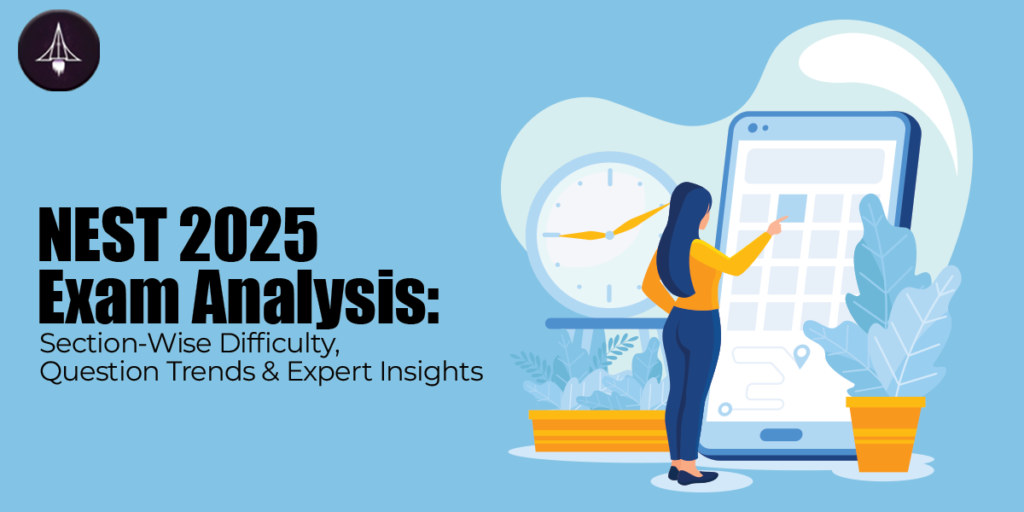The Big Day: A Test of Knowledge, Strategy, and Nerves
The National Entrance Screening Test (NEST) 2025 is more than just an exam—it’s a life-changing moment for thousands of students dreaming of a future in research. Months of preparation, sleepless nights, endless mock tests, and countless moments of self-doubt all lead up to this one day.
And when you finally walk into the exam hall, heart pounding, pen in hand, one question echoes in your mind:
“Was I ready for this?”
If you’ve just taken the NEST 2025 exam, or are preparing for it next year, this detailed section-wise analysis will help you understand:
- How tough was NEST 2025?
- Which sections were trickiest?
- What question trends appeared?
- How to prepare smarter for next year?
Stay Tuned!
Exam Pattern for NEST 2025
| Mode: | Computer-Based Test (CBT).
The question paper will consist of four sections of objective (MCQ) |
| Duration: | 3.5Hours |
| Total Marks: | 240 |
| Subjects & Marking: | Physics: 60 marks
Chemistry: 60 marks Mathematics: 60 marks Biology: 60 marks (Each section is worth 60 marks and will contain subject-specific questions from biology, chemistry, mathematics, and physics. Each section will have 20 questions, with exactly one correct answer. ). |
| Marking Scheme: | +3 for each correct answer
-1 for each wrong answer (No marks will be deducted for not answering a question.) |
The language of the question paper will be Hindi and English. The English question paper will be considered the standard if there is any confusion/discrepancy due to language.
The merit list for both institutes will be prepared using the best three scores out of the four sections, and the section with the worst score will not be considered. That is, scores out of 180 will be considered for preparing the merit list. How to Prepare for the NEST Exam 2025? Best Study Plan, Tips
Section-Wise NEST 2025 Difficulty Analysis
1. Physics – A Battle of Concepts & Calculations
✅ Level: Moderate to Difficult
✅ Type of Questions: Numerical-heavy, concept-based, tricky application problems
✅ Key Topics Covered:
✔️ Electrostatics & Magnetism (hardest)
✔️ Thermodynamics (concept-based)
✔️ Mechanics & Kinematics (calculation-heavy)
✔️ Optics & Modern Physics (comparatively easier)
Student Reaction: Many students found numerical questions time-consuming, while conceptual problems were solvable if the basics were strong.
Expert Tip: For NEST 2026, focus on high-weightage topics like electromagnetism and mechanics. Speed up calculations to manage time better.
2. Chemistry – The Perfect Mix of Theory & Numericals
✅ Level: Moderate
✅ Type of Questions: NCERT-based, reaction mechanisms, numerical problems
✅ Key Topics Covered:
✔️ Organic Chemistry – Reaction mechanisms, aromatic compounds
✔️ Physical Chemistry – Electrochemistry, chemical equilibrium
✔️ Inorganic Chemistry – Coordination compounds, periodic table trends
Student Reaction: Chemistry was NCERT-based but required strong conceptual clarity. Some numerical problems were tricky but solvable.
Expert Tip: Master NCERT first, then practice numericals & reaction mechanisms from standard books like Morrison & Boyd (Organic), P. Bahadur (Physical), and J.D. Lee (Inorganic).
3. Mathematics – A Race Against Time
✅ Level: Difficult
✅ Type of Questions: Pure concept-based, problem-solving, tricky algebraic manipulations
✅ Key Topics Covered:
✔️ Calculus – Limits, Differentiation, Integration (major weightage)
✔️ Algebra – Quadratic equations, Matrices & Determinants
✔️ Probability & Permutations – Logic-based tricky questions
✔️ Coordinate Geometry – Easy but time-consuming
Student Reaction: Many students found Mathematics time-consuming, with lengthy calculations. The difficulty was similar to JEE Main.
Expert Tip: Practice time-based problem-solving. Solve JEE-level problems to improve speed and accuracy.
4. Biology – The Balance Between Memory & Understanding
✅ Level: Easy to Moderate
✅ Type of Questions: NCERT-based, logical, diagram-based
✅ Key Topics Covered:
✔️ Genetics & Evolution – Major weightage
✔️ Human Physiology – Direct NCERT-based
✔️ Biotechnology – Application-based
✔️ Ecology & Environment – The easiest section
Student Reaction: Most students found Biology manageable, with NCERT-based questions. Logical reasoning-based biology questions were unexpected but solvable.
Expert Tip: Stick to NCERT line-by-line but focus on logical application-based questions.
Final Verdict: Was NEST 2025 Tough?
Overall Difficulty Level: Moderate to Difficult
Most Difficult Section: Mathematics & Physics
Most Time-Consuming Section: Mathematics
Easiest Section: Biology
Key Takeaways for Future Aspirants:
Physics & Chemistry: Focus on numericals & conceptual clarity.
Mathematics: Improve speed & problem-solving skills.
Biology: Stick to NCERT but expect some logical questions.
What’s Next?
For those who gave NEST 2025, analyzing your performance is key:
✅ Which sections felt easier?
✅ Where did you struggle the most?
✅ Did you manage time well?
For NEST 2026 aspirants, the biggest lesson is:
This isn’t just about knowledge—it’s about strategy, time management, and practice.
Final Words: You Are Stronger Than This Exam
No matter how tough NEST 2025 felt, remember: an exam doesn’t define you. If you did well, congratulations! If not, it’s just a stepping stone to something greater.
Science isn’t about one exam—it’s about curiosity, persistence, and the courage to keep going. So, whether you’re waiting for results or preparing for next year, never stop believing in yourself.
💬 Tell us in the comments—How was your NEST 2025 experience? 👇
About us: Sciastra
At SciAstra, we guide students who want to become scientists and pursue research by helping them secure admissions in the top colleges for the same like IISER, NISER, CEBS, ICAR, CMI, etc.
Our mentors are from the top research institutes like IISER, NISER, IACS, CMI, ISI, IISC Bangalore, and so on. If you are looking to prepare for IAT / NEST 2025, you can check out our courses and get access to live classes, recorded lectures, study material, mock tests, doubt-clearing classes, and much more!
To know more about us, click here OR download the SciAstra App from Play Store or App Store!





